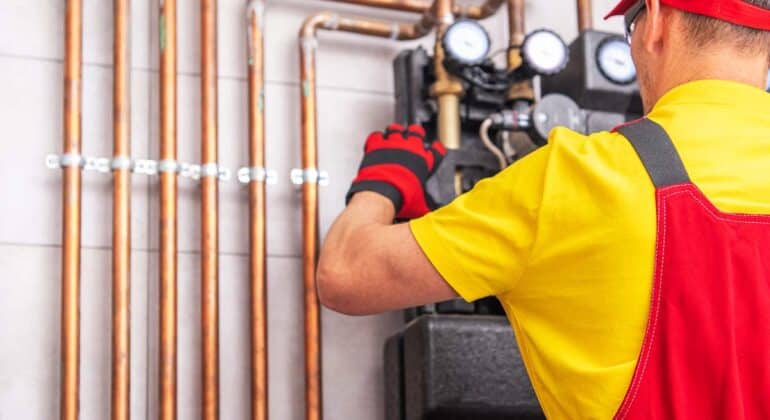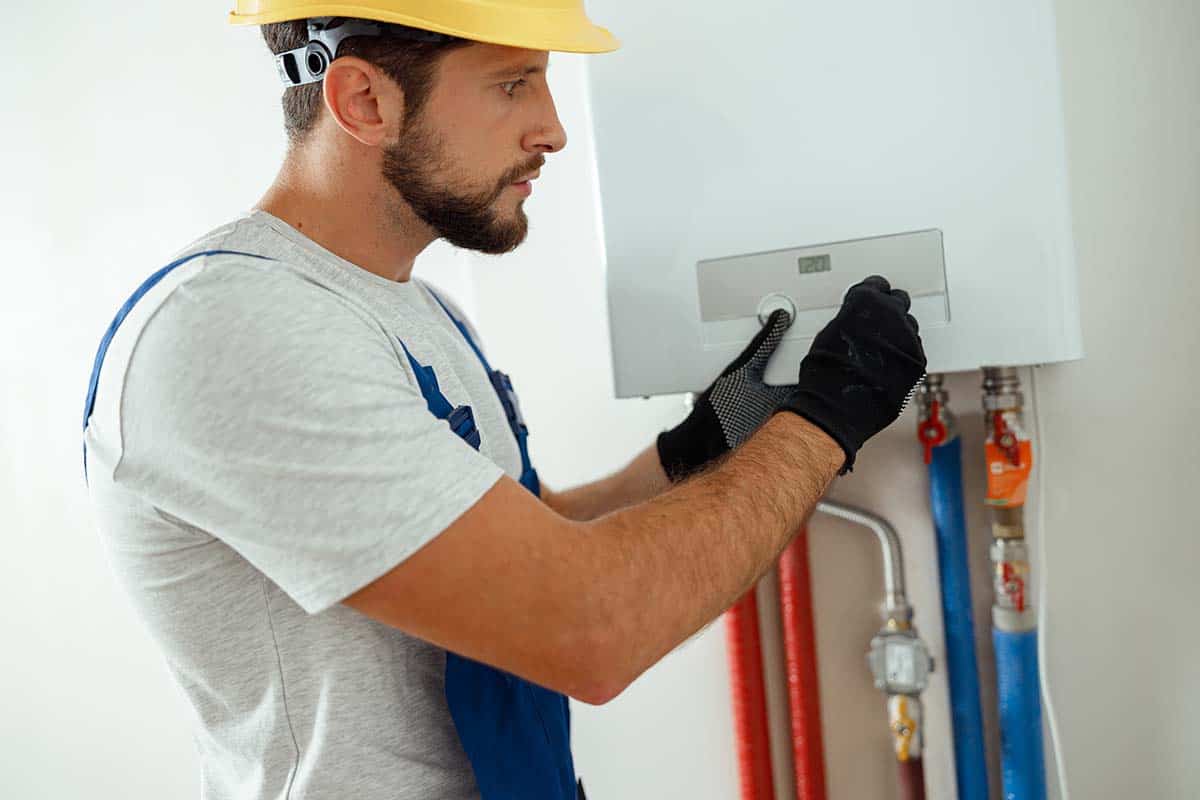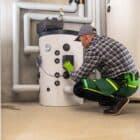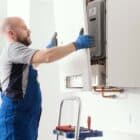Deciding which boiler suits your home isn’t straightforward. You may have heard that combi boilers are popular, but what’s the hype about? If you’re curious about the advantages of combi boilers over older models, we recommend reading this guide to water heating boilers. It covers all the essential details about combination boilers. And if you require combi boiler repairs, feel free to get in touch with us for more information.
Key Takeaways on How Combi Boilers Run
- Combi boilers come with a central heating boiler and hot water tank in the same unit
- They are at an advantage in terms of efficiency compared to other boiler types and can last up to 15 years with proper use
- There are some downsides as well, one being they aren’t a good choice for large homes
- Installation is easy and cheaper because a combi boiler acts as a single appliance, plus there is no need for a storage tank
What is a combination boiler / What is a combi boiler system?
A combination or ‘combi’ boiler pairs a water heater and a central heating system in the same unit, making it very convenient for families. If the system generates a surplus of heat, it will be stored in a compartment inside the boiler called a heat exchanger. Not only do they take less space this way but also combi boilers provide hot water on demand.
By contrast, regular boilers need a separate tank for the hot and cold water. Hot water for the central heating system is delivered by the cylinder and cold water is transferred to the boiler to use for daily showers and tap water.
The difference between combi boiler and system boiler is that the latter contains a cylinder that stores hot water for late use, whereas the former gives you hot water on demand. There is no need for storage. System boilers take up more space and suit better larger homes.
Can a combi boiler explode?
If your boiler gets overheated, yes, it can explode. That’s why if you notice any warning signs your unit is not working properly, you should call in an expert to deal with the issue.
Boiler controls
- Power switch
- Pressure gauge
- Eco button
- Central heating dial
What is the difference between a Combi Boiler and a Conventional Boiler?
With standard boilers, there is a separate cold water cylinder and hot water storage tank. It takes time for the unit to heat some water. The cold water storage tank has to be installed as high up as possible to facilitate water pressure. For this reason, in most cases, it is usually placed in the attic.
As far as combi boilers as concerned, they are pretty much what the name suggests. They combine the cold and hot water in one unit and you can have hot water instantly, as you turn the hot water tap on. Meaning, you don’t have to wait for the boiler to heat the water so you can shower. This can be pretty practical.
Types of Combi Boilers
Combi boiler is one compact system that can run on different types of fuel.
- Electric powered boilers offer great energy efficiency with no waste. However, these boilers also prove costlier to run.
- Gas fuelled combi boilers use the likes of natural gas to run. It’s without a doubt one of the most common type of boiler in the UK. It saves a huge chunk of your electric bill. In addition, it is considered one of the most environmentally friendly options, even though gas is produced from fossil fuels that can be damaging.
- Oil combi boilers are great for households that do not use gas. It’s still a cost-effective option but it can be a little difficult to maintain because oil presents with certain challenges. Not to mention, an external tank is needed to store the oil, which will take up valuable space in your home or garden.
- Liquefied Petroleum Gas boilers, or LGP, are boilers that run on a combination of oil extractions and natural gas. It’s a bit better than oil solely, as it’s cleaner and cheaper to use.
Are Combi Boilers More Efficient than Other Main Types of Boilers?
Yes. Combi boilers are considered quite efficient since they only heat the water you need. These boilers are also environmentally friendly. You get hot water and central heating at the same time, while you save money on your heating bills unlike with the traditional heating and hot water of a regular unit.
However, you should remember that the type of heating system needs to fit your household needs. A conventional boiler will be able to operate more water usage at the same time and is ideal for homes with two or more bathrooms.
Can combi boilers run two showers?
It is not recommended to go with two showers when it comes to a combi boiler, the reason being it heats water directly from the water mains. Stick to one shower.
Is a combi boiler cheaper to run?
It should be. According to experts, a combi boiler would totally save a good 20-35% on gas bills.
How long does a combi boiler last?
Combi boilers can last a good 15 years if properly maintained. The lifespan also varies depending on the brand and quality of the unit. More expensive pieces aren’t always the best but the price is often an indicator of the quality, so choose wisely. Ideally, you will get an A-rated boiler. Check out our more detailed guide on how long boilers last.
Benefits of a Combi Boiler – Pros and Cons
So, what are the advantages of a combi boiler system? Combi boilers are quite compact, which makes them perfect for small households. The reason for this is that they don’t have a cold water tank. They are also very efficient and easy to install – a day’s work at most.
One of the greatest benefits is that you get hot water instantly, so you will never run out of hot water. This is a crucial point for families with kids and pets. Last but not least, they are more energy efficient than old regular boilers, meaning you will save money on your bills.
As for the downsides, combi boilers are not suitable for bigger houses since they cannot meet higher water demand. And if they break down, you lose any central heating and hot water system at once since a combi boiler doesn’t feature a separate hot water storage tank. This means that until the unit is repaired, you will not be getting heat or water in your home, and that can be a major turn-off.
Another thing to take into account is that these boilers may take longer to perform certain tasks such as filling a bathtub with water due to a slower rate of water.
Is My Home Suitable For A Combi Boiler?
That will depend on the size of your home and your needs. Combi boilers are most efficient in small and medium properties. They can meet low demands for hot water and heating. If you live in a tiny flat or house, this might be the best option for you since a combi boiler takes up less space.
If you have 1 bathroom and up to 10 radiators, you should look for a 24 to 27kw combi boiler at most. But if your home accommodates 1 ensuite bathroom, 1 bathroom, and up to 15 radiators of average size, you are going to need a 28-34kw combi boiler.
How Long Does It Take To Switch Conventional to Combi Boiler?
If everything goes right, the job will not take more than 4-6 hours, which means your boiler will be installed in one day.
Convert a Conventional Boiler to a Combi Boiler with our Help
You don’t have to worry about the different aspects of installing a combi boiler or what boiler size you need because you can count on us. Our team of professionals has years of combined experience and knows their work. We are qualified to provide gas and boiler repair plus installation, so you can rest assured the job will be carried out to a high standard. If you have any questions, feel free to get in touch with us.
If you want to learn more about different types of boilers and which one might be the best fit for your home, check out our article on “Condensing vs Non-Condensing Boilers – Understanding the Key Differences.” It provides valuable insights and information that can help you make an informed decision. Don’t miss out on this important information and click through to our article now!
FAQ on How a Combi Boiler Works
What is involved in changing to a combi boiler?
A few steps need to be taken to change to a combi boiler: drain the entire heating system, the radiators and boiler included; remove the old boiler, then head tank and cylinders; make sure the gas pipework is 22mm; and install the combi boiler. Next, you need to do a power flush of the system, install a thermostat and configure it. The last step is to do safety checks. Don’t forget to register the warranty.
What is the best temperature for a combi boiler?
The temperature should be between 60 and 70°C if you are looking to achieve optimal performance and efficiency. Do not get it higher than that.
Can I use a combi boiler for hot water only?
Yes, you can. Energy efficient combi boilers come with various settings that allow you to choose exactly what they do. Meaning, you can use them for hot water only.
Do you need a water tank with a combi boiler?
No, you don’t. Modern combi boilers don’t necessitate a cold water storage tank in the loft space because they heat water directly from the mains.
Are combi boilers gas or electric?
They can be both. If your boiler has a pilot light in the heater, it means you are dealing with a gas boiler. If there is no light, then it is an electric boiler.
Can combi boilers heat water and radiators at the same time?
No. When you run the hot tap, a valve in the system should close the pipe to the radiators so you don’t get that nasty water from the radiator into your household taps.
What are the different types of boilers?
Boilers can be classified into two main types: watertube and firetube. They differ in the position of the boiler steam or combustion gases. Before you have a new boiler installed, consider these differences and select a unit that can satisfy your heating needs.
Do all boilers need a flue?
Pretty much yes. A flue is that part of the boiler that lets exhaust gases out of the system. The only unit that doesn’t use a flue is a back boiler but there are extremely rare these days.
Can you replace a conventional boiler with a combi boiler?
Absolutely. You will gain plenty of benefits if you do so.
Can I install a combi boiler myself?
You had better refrain from assembling a combi boiler yourself. You may get it wrong and put your life at risk. Plus, there are certain specifics of the job that only a qualified expert is allowed to do. It might also be true that a boiler system installed by a non-expert will be void of warranty.
Combi Boiler Vs Conventional Boiler System: Is a Combi Boiler Better?
Whether a combi boiler is suitable for you depends on different factors. Combi boilers have their place in the household. But despite them taking less space and reducing your heating bills, they aren’t the best solution for everyone.
Some households will benefit from regular systems since there is a need for a separate water tank. You have to evaluate your heating needs to determine the type of system you should install in your home. The more you plan this, the better the boiler will work, regardless of boiler design or brand.
Don’t hesitate to reach out for assistance with your combi boiler, whether you need combi boiler installation or repair services. Our team is here to help and provide you with the expert support you need.
If you’re interested in learning about how to troubleshoot and fix common boiler issues, we have two articles that you might find helpful: “Worcester Boilers Problems – Common Issues and How to Fix Them” and “Most Common Vaillant Boiler Problems – What they Are, How to Fix them.” These articles provide valuable insights and practical tips on how to keep your boiler running smoothly and be aware of the boiler warning signs you shouldn’t ignore. Don’t miss out on this important information and click through to our articles now!




